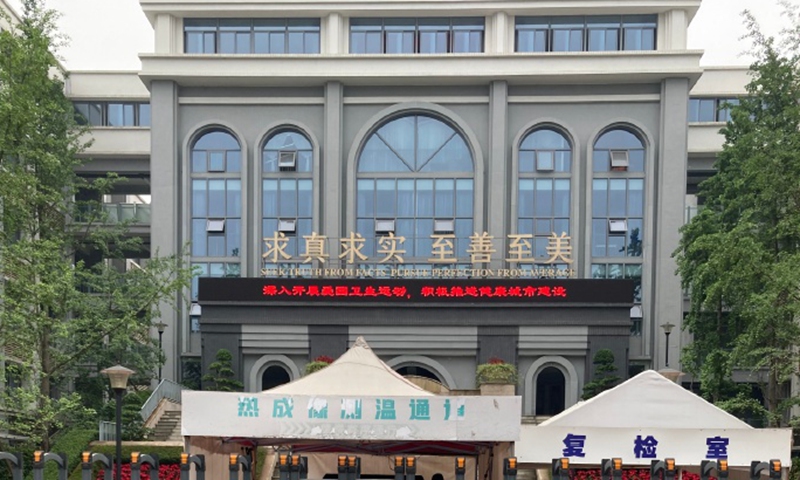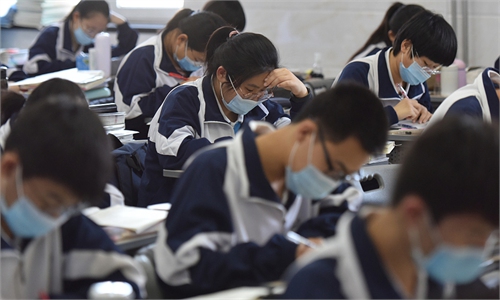Public opinion shift over student's death shows Chinese netizens' increasing vigilance against 'color revolution'
Public opinion U-turn over student's death shows Chinese netizens' increasing vigilance against 'color revolution'

The 49th High School of Chengdu Photo: Screenshot of Weibo
As public opinion over the death of a 16-year-old student in Southwest China's Sichuan suddenly spilled out of cyberspace and turned into a rare outburst with some openly demanding the "truth" and clashing with the police in front of the school premises, some netizens have raised questions about whether forces with ulterior motives were fanning the flames, and cautioned that the incident could be hijacked and used by these forces in attempt to stir a "color revolution."
A student surnamed Lin, from the 49th High School of Chengdu, capital of Sichuan, fell to his death on campus on Sunday. The death stirred a huge online response as Lin's heartbroken mother took her protest to Sina Weibo, questioning why the school only informed her two hours after the incident and why the school refused to show her the complete surveillance footage.
Before the Xinhua News Agency released a comprehensive report on Thursday that clarified all key inquiries among the public with details, for two days, the voices on social media were almost unanimously against the school and local authorities, criticizing their response to the tragedy as "insensitive," too brief and lacking in details.
However, apart from reasonable questions and criticism over the case, a group of "internet celebrities" or we-media accounts used the tragedy to hype rumors and spread disinformation, such as accusing the school of "hiding the truth"; "the slow response of the school and the police caused the death of the student," and even suspecting the tragedy was a "case of murder," even after the police excluded the possibility.
Some foreign media and "internet celebrities" with long-standing anti-China stances have also hyped the rumors and spread radical emotions against the Chinese government on Twitter.
Many Chinese web users share a sense that many unknown forces with influence are using the case to push public emotion to the boiling point among Chinese social media networks.
Public opinion hit a "turning point" on Tuesday night after an online video emerged showing a group of people who came to the school with white flowers in their hands and shouted slogans demanding "the truth behind the death."
Many web users have expressed their concerns as they found there are similarities to the color revolution in this incident, such as organized protesters mobilized by online rumors and driven by radical emotion making a disturbance and having conflicts with police on the street.
"This looks too similar to what happened in Hong Kong [in] 2019; who are these people? They are definitely not the locals because they don't have local accents," said a web user on Sina Weibo, while many others shared the same feelings.
"We want the truth, but no one should use the death of the student as a pretext to challenge law and order," another netizen said.
So far, there is no hard evidence to prove this incident is organized by anti-China foreign forces, and the incident may simply be an isolated case where ignorant people influenced by rumors and fragmented information expressed their sheer indignation toward the handling of the incident by the school and authorities they believed improper when the results of the official investigation were not available.
But the reaction of some Chinese netizens toward the incident shows that some Chinese people are keeping high alert and have great concerns over the Western-backed color revolution.
After the detailed Xinhua report cleared up online rumors and accusations one-by-one by releasing surveillance footage, on-site pictures and testimony, which dismissed the online brewing sentiment against the school and local authorities, many web users have apologized for their irrational sentiment previously driven by rumors and disinformation.
From filing abuse against local authorities, spreading disinformation and rumors, to regaining rationality, apologizing for immaturity at the very beginning, and regaining trust toward the government, the Chinese public opinion met a real turning point on Thursday. Analysts said this has proven that the fast reaction and responsible investigation of the relevant authorities, and the detailed interviews done by the media, are crucial to saving the credibility of the government amid public relations crises, and the Chinese society is also maturing, so that the relations between the public and the government in China is solid, rather than fragile.
Chinese experts said the concern or sensitivity among some Chinese people against the color revolution was caused by the intense China-US relations and the unfriendly ties between China and the West. The Hong Kong turmoil in 2019 has increased this kind of sensitivity to a new height in Chinese society, and adding the memories of the late 1980s and other examples in Eastern Europe, Russia, as well as a series of geopolitical disasters after the Arab Spring, some Chinese people are keeping high alert to any incident that looks similar to a Western-backed color revolution.
"We have no clear and direct evidence to accuse anyone of using this case to launch a 'color revolution' against the Chinese government, but it's reasonable for some people to express their concerns," Shen Yi, a professor at the School of International Relations and Public Affairs at Fudan University in Shanghai, told the Global Times on Thursday.
Chinese police have uncovered a lot of similar cases in the past, which use social media to spread rumors online on some incidents that sparked public concerns, and to incite conflicts against the government and damage public order on the streets.
"Not all people who raised questions or criticized the local authorities are troublemakers, as people do have right to criticize and question the government on a constructive basis. It's totally normal for the people to express their concerns as the case is related to the school, the students' security and the public's right to know, which concerns the whole of society," said a Beijing-based analyst on media affairs and public opinion who required anonymity.
"So there is a lesson that should be learned by the government, the media and the public. Any case like the Chengdu 49th High School tragedy needs time to investigate, and the release of key information will decide the reaction of the public. Before the law enforcement agencies and other authorities reach a final conclusion, there is time for hostile forces and anti-government activists to spread rumors and disinformation," he said.
Shen noted that in this period, the media should guide reasonable thinking and mature discussion of the case, raise questions and do interviews and investigations immediately, "so that the media could, at least, provide more details to meet the demand for information among the public, rather than cater to irrational emotion online. This would create conditions for some forces to spread rumors and incite conflicts."
Additionally, we-media accounts that spread disinformation and rumors should be investigated as well, and those who were found to have organized or incited illegal activities on Tuesday night should also be investigated according to the law, Shen said.


